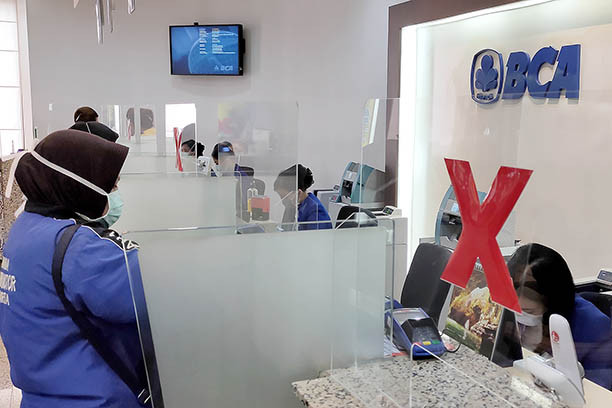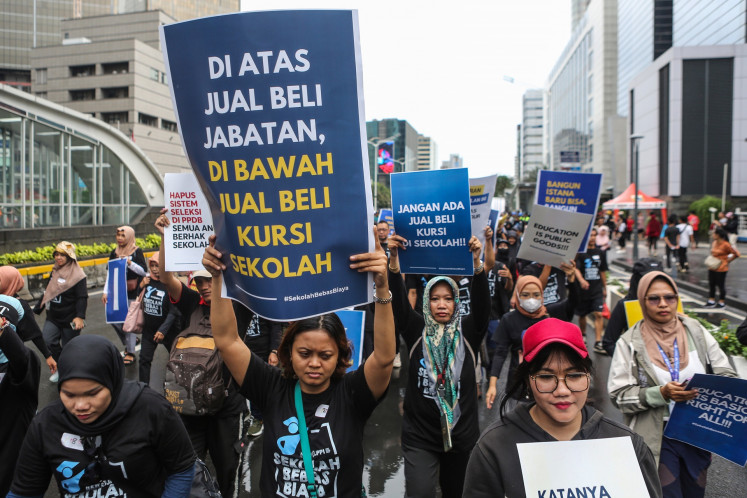BCA profit falls 4.2 percent as loan provisions rise during health crisis
The bank’s provisions has skyrocketed by 160.6 percent to Rp 9.13 trillion as of September.
Change text size
Gift Premium Articles
to Anyone
 Full service: A customer (left) is attended by a Bank BCA teller in its branch on Jl. Sudirman in Yogyakarta in this undated photo. The bank has remained operational amid the COVID-19 pandemic by implementing health protocols. (JP/Donny Fernando)
Full service: A customer (left) is attended by a Bank BCA teller in its branch on Jl. Sudirman in Yogyakarta in this undated photo. The bank has remained operational amid the COVID-19 pandemic by implementing health protocols. (JP/Donny Fernando)
P
ublicly listed Bank Central Asia (BCA) recorded a drop in net profit in the first nine months of the year as it set aside more loan provisions to cover for potential bad loans amid the economic crisis.
The country’s largest privately owned bank by assets has booked Rp 20.04 trillion (US$1.37 billion) in net profit as of September, a 4.2 percent decline from Rp 20.92 trillion in the same period last year.
“The decline in profit during the first nine months of 2020 was caused by higher loan provisions,” BCA spokesperson Hera F. Haryn told an online press briefing on Monday.
The bank’s provision skyrocketed by 160.6 percent to Rp 9.13 trillion as of September. The highest provisioning happened during the second quarter of 2020 following the implementation of strict restrictions to curb the spread of COVID-19.
Indonesia’s economy is expected to enter into a technical recession in the third quarter of this year as the government continues to impose large-scale social restrictions (PSBB), resulting in businesses closing for good or temporarily and hampering their ability to repay loans.
Despite already having a high non-performing loan (NPL) coverage, BCA president director Jahja Setiaatmadja said the bank continued to set aside higher provisions as a precaution.
“We reserve whatever we can as a precautionary measure by learning the probability of each loan,” he said.
The fear of deteriorating loan quality seemed to stem from the fact that the bank’s bad loan ratio was recorded at 1.9 percent as of September. The figure, however, improved from 2.1 percent recorded in the first half of this year.
About 41 percent of bad loans were caused by commercial and small and medium enterprises (SMEs) followed by the consumer sector, which contributed to 34.2 percent of the total NPL.
The bank’s loan growth also slowed in the first nine months of the year. BCA’s loan growth fell by 0.6 percent during the period as Jahja said the amount of paid back loans were higher compared to disbursed loans.
“The negative growth is not because we’re reluctant to disburse new loans,” he said. “We always seek opportunities to disburse new loans, but the rate of repayment is much faster than the disbursement.”
BCA forecasts loan growth to reach 1 to 2 percent this year.
Finance director Vera Eve Lim said the bank expected corporate loans to be the lender’s loan growth driver amid the pandemic.
“We expect corporate loans to grow 10 to 12 percent this year as we estimate other segments, especially consumers, to fall,” she said.
She went on to say that the bank estimated consumer loans to fall by 12 to 14 percent this year due to slowing housing mortgages and automotive loans.
The public’s appetite to save is higher than to borrow, as evident in BCA’s positive growth in third-party funds in the first nine months of this year. Third-party funds have jumped by 14.3 percent to Rp 780.68 trillion as of September.
Mirae Asset Sekuritas analyst Lee Young Jun wrote in a research note on Tuesday that BCA’s ability to improve its NPL ratio by the end of the third quarter was supported by its prudent risk management.
He also lauded the bank’s ability to manage its net interest margin (NIM) amid sluggish loan growth at 5.83 percent at the end of the third quarter, 13 basis points lower from the previous quarter and still much higher than the industry figure of 4.43 percent in August.
“We believe ample liquidity will give room for BCA to manage its funding cost further. Thus, we expect a contraction in NIM to be limited in the fourth quarter of 2020,” he wrote in the note.
Lee, however, warned that investors should watch out for risks that could impact the bank’s performance in the coming future, including a rising number of new COVID-19 cases and an increased default rate for restructured loans.
BCA’s shares, traded at the Indonesia Stock Exchange (IDX) under the ticker code BBCA, fell slightly by 0.26 percent to Rp 29,000 apiece as of 11.30 a.m. on Wednesday. The bank’s share price has fallen by 13.24 percent since the beginning of the year, compared to an 18 percent drop in the broader Jakarta Composite Index.









